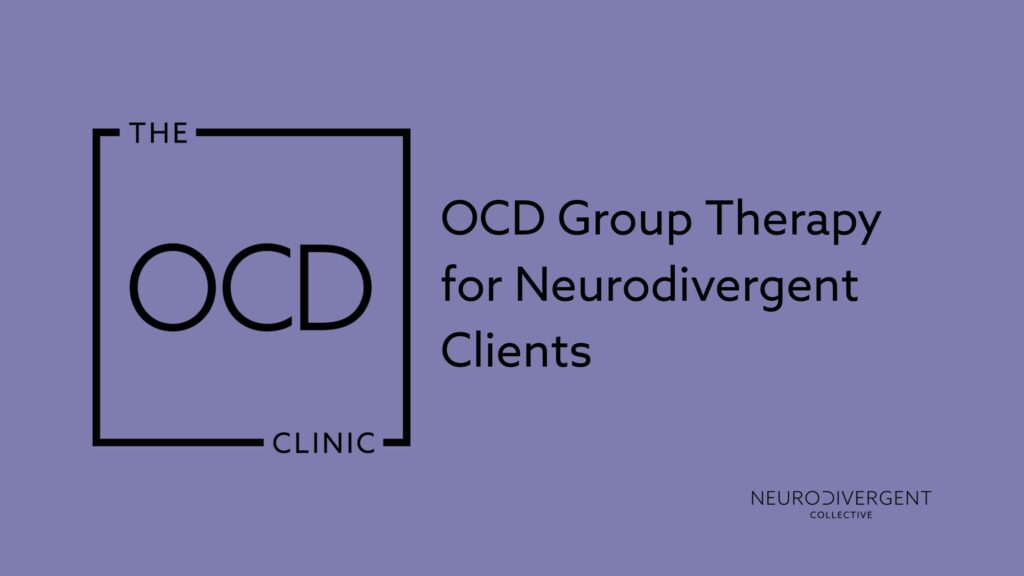
The OCD Clinic at The Neurodivergent Collective offers 8-10 hours of group therapy weekly (2 hours per morning) throughout eight weeks of programming. These groups are specifically tailored and paced to be neurodivergent-affirming, accounting for differences in processing, communication, and sensory needs.
Process Group
This group provides a structured, consistent, and predictable environment for exploring current thoughts, feelings, and relational patterns in the here-and-now. We use explicit guidance to help clients identify interpersonal dynamics and communication styles (which can be non-standard in neurodivergent populations), emotional responses, and their connection to OCD symptoms or avoidance behaviors. The group emphasizes interpersonal learning, explicit feedback loops, and developing healthier coping and relational strategies that respect diverse communication needs.
Values-Based Actions
Grounded in Acceptance and Commitment Therapy (ACT) principles, this group supports clients in clearly defining their personal, core values—the principles that give life meaning. We focus on translating these values into actionable, concrete, and measurable goals to ensure clarity and success in executive planning. Clients identify valued life domains, anticipate neurodivergent-specific barriers (e.g., executive dysfunction, sensory overload), and practice defusion and willingness strategies to move toward chosen actions. The group strengthens motivation and anchors ERP work in value-driven choices, reinforcing commitment to recovery even when motivation flags.
OCD Story
This group provides structured psychoeducation and Narrative Therapy techniques tailored for deep conceptual understanding. Clients are guided to externalize OCD as a separate entity (“the OCD villain”) from their core self-identity, which can be critical for individuals who often internalize struggles. We systematically map the obsessive-compulsive cycle, identifying how intrusive thoughts, appraisals, and rituals function. By developing a personalized “OCD story,” clients increase explicit insight into the mechanisms maintaining symptoms and begin to articulate a preferred narrative aligned with their values and long-term goals. This group builds essential intellectual scaffolding for engagement in ERP and I-CBT.
DBT for OCD
This group integrates Dialectical Behavior Therapy (DBT) skills, focusing on emotion regulation and distress tolerance to manage the intense emotional states and urges that accompany OCD, which can be amplified by emotional intensity and rejection sensitivity often experienced by neurodivergent clients. Clients learn and practice evidence-based, practical skills (e.g., Opposite Action, paced breathing, and chain analysis) to reduce reliance on compulsions and self-defeating behaviors. The group emphasizes skills generalization to ERP work, providing clients with a toolkit to tolerate the distress of exposures and approach them with greater stability.
ACT for OCD
This group applies Acceptance and Commitment Therapy (ACT) interventions to OCD symptoms, specifically targeting the development of psychological flexibility. Clients learn strategies for defusion from intrusive thoughts, acceptance of internal experiences (e.g., intense emotions or bodily sensations), and mindfulness in the present moment. Through structured, experiential exercises and discussion, participants practice responding to obsessions with openness and observation rather than attempts at control or intellectual avoidance, allowing them to engage more fully in both the behavioral demands of ERP and daily functioning.
Exposure and Response Prevention (ERP)
This group is devoted to highly structured, guided exposure practice with strict response prevention. Clients systematically identify feared situations, predict anticipated outcomes, and engage in in-session exposures designed to challenge maladaptive threat appraisals. Facilitators guide clients in techniques like expectancy violation, reduction of subtle safety behaviors, and affect labeling during exposures. The group emphasizes variability and retrieval cues to maximize inhibitory learning and generalization of gains across diverse, real-world contexts. Clear, concrete homework assignments extend practice outside the session, strengthening learning and treatment momentum.
Inference-Based CBT (I-CBT)
This group targets the reasoning processes underlying obsessive doubt—a frequent struggle for highly analytical neurodivergent clients—with a focus on correcting inferential confusion. Clients learn to identify the “portal” stories that lead from observed reality into imagined possibility and practice distinguishing probability from possibility. Through present-evidence exercises and reality-sensing strategies, clients are trained to build trust in their sensory experience and here-and-now information. The group helps clients shift away from compulsive checking and mental rituals, reducing reliance on imagined scenarios and reinforcing adaptive, evidence-based reasoning.
Shame Resilience for OCD
This group is designed to help clients recognize and challenge the intense internalized shame often connected to living with OCD, particularly shame related to executive functioning failures, emotional meltdowns, or perceived differences. Through guided, safe discussion, peer validation, and evidence-based strategies, participants will learn how to separate self-worth from symptoms, build self-compassion, and strengthen resilience in the face of intrusive thoughts and compulsions. The group emphasizes genuine connection, courage, and practical tools for reducing shame, fostering a healthier sense of identity, and supporting long-term recovery.
Do you have a question?
Send us a message

